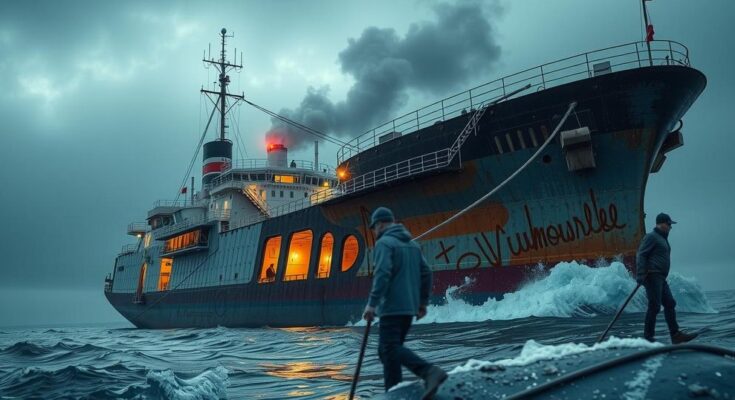A Russian cargo ship sank in the Mediterranean while reportedly en route to collect arms from Syria, causing concern amidst heightened military cooperation between Russia and North Korea, which has resulted in over 3,000 casualties among North Korean troops. Ukraine’s President Zelensky warns of risks associated with this partnership, while Italy pledges to continue military support for Ukraine until 2025. Additionally, Zelensky criticizes Slovak leadership for reliance on Russian gas amid security concerns.
In recent developments concerning the Ukraine-Russia conflict, a Russian cargo ship named Ursa Major, which was reportedly en route to Syria for arms collection, has sunk following an explosion in its engine room while navigating between Spain and Algeria. Out of the 16 crew members, two are missing, while the remaining 14 were rescued and brought to safety in Spain. Ukrainian military intelligence has suggested that this vessel was engaged in efforts to transport military supplies amid the ongoing war, particularly highlighting the diminishing support for the regime of Bashar Al-Assad in Syria.
Moreover, President Volodymyr Zelensky of Ukraine has raised alarms regarding the escalating military collaboration between Moscow and Pyongyang, asserting that North Korean casualties among troops aiding Russian forces have reached over 3,000. Zelensky articulated concerns about potential further deployment of North Korean soldiers and equipment to assist Russia, stating: “There are risks of North Korea sending additional soldiers and military equipment to the Russian army, and we will have tangible responses to this.”
In terms of international support for Ukraine, Italy’s government has committed to extending military assistance until the end of 2025 amid ongoing efforts to fortify Ukraine’s defense against Russian advances. The cabinet’s decree allows for the provision of means, materials, and military equipment, complementing the 10 prior aid packages approved since the onset of the war, which began in February 2022.
Furthermore, President Zelensky criticized Slovak Prime Minister Robert Fico for being reluctant to reduce Slovakia’s dependency on Russian gas. Following a meeting with President Vladimir Putin, Mr. Fico has been accused by Zelensky of neglecting alternative energy solutions that could mitigate security concerns for Europe. Zelensky emphasized that while Slovakia has a long-standing contract with Gazprom, reliance on Russian gas constitutes a severe risk to regional security.
The ongoing conflict between Ukraine and Russia has drawn increased international attention, particularly regarding military actions and international relations. The sinking of the Ursa Major highlights not only the perilous conditions facing maritime operations but also the broader implications of military logistics in wartime settings. The partnership between Russia and North Korea emphasizes the growing concern over military cooperation that could affect global security. Additionally, countries like Italy have taken proactive steps to support Ukraine, reflecting shifting alliances and geopolitical strategies.
Recent events underscore the deteriorating security situation in Eastern Europe, with the sinking of a Russian vessel linked to arms procurement efforts amidst a heightened military alliance between Moscow and North Korea. President Zelensky’s warnings regarding potential increases in North Korean military support to Russia reveal the precarious balance of power in the region. Meanwhile, Italy’s commitment to aid Ukraine illustrates ongoing international support against Russian aggression, as tensions continue to shape the landscape of European security.
Original Source: www.independent.co.uk




